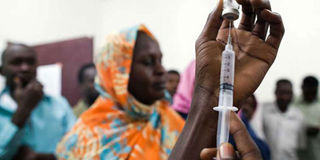Health ministry confirms second yellow fever case in Nairobi

A handout picture released by the United Nations-African Union Mission in Darfur (UNAMID) shows a staff member of the Teaching Hospital in El-Geneina in West Darfur preparing a vaccine against yellow fever on November 14, 2012. A second case of yellow fever has been confirmed in Kenya. PHOTO | AFP
What you need to know:
The ministry said it took blood samples from three people who landed from Angola to Kemri for analysis.
The first case was of the 31-year-old man who died at KNH.
The second case — also a man — arrived in the country on March 7 from Angola.
Dr Muia urged Nairobians not to panic as the disease is non-contagious.
Ministry of Health officials have confirmed another case of yellow fever in Nairobi.
It is the second case in less than a week after a man died at Kenyatta National Hospital on Tuesday night.
The ministry Thursday said it took blood samples from three people who landed from Angola to the Kenya Medical Research Institute for analysis.
The first case was of the 31-year-old man who died at KNH. He landed at Jomo Kenyatta International Airport on March 12.
The second case — also a man — arrived in the country on March 7 from Angola, according to Nairobi County Health Executive Bernard Muia.
Dr Muia said the 30-year-old Kenyan travelled to Magadi and got back to Nairobi two days ago.
“He had headache, fever, muscle pains and vomited. Medics at a South C hospital suspected he had yellow fever,” he said.
NON-CONTAGIOUS
The viral disease has killed more than 250 people in the southern African state.
The man is recuperating in his South C house.
Dr Muia urged Nairobians not to panic as the disease is non-contagious.
Acting Director of Medical Services Jack Kioko said he was aware of the case.
“This is an indication of our enhanced surveillance systems,” said Dr Kioko.
He said the first patient was under a mosquito net during his admission at KNH.
“We have also taken samples from his family as well as health workers who attended to him,” he added.
The county government last month vaccinated almost 3,800 people against yellow fever.
Dr Muia said the country had more than 7,000 yellow fever doses and “enough resources to scale up our stocks if need be”.
Kenyans travelling to and from any yellow fever-prone countries are required to have a copy of a vaccination certificate.
Foreigners arriving in the country from such areas should have been vaccinated at least 10 days before their travel.






